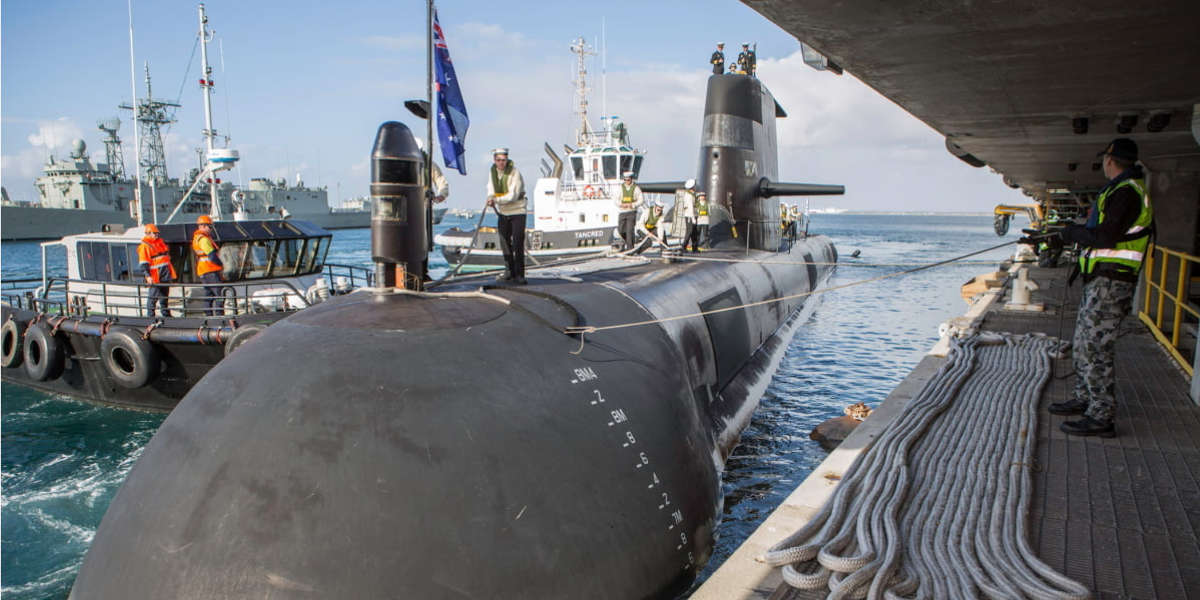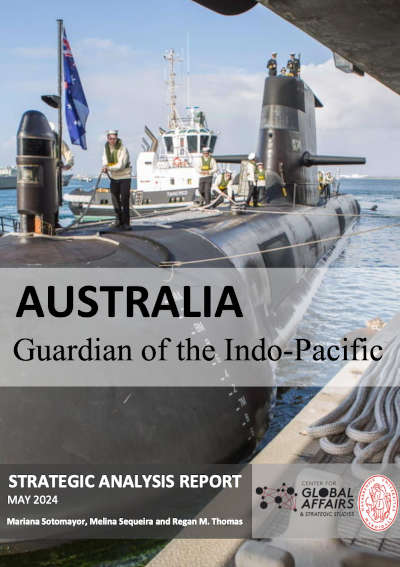In the image
HMAS Rankin comes alongside Diamantina Pier, Fleet Base West [RAN].
EXECUTIVE SUMMARY
This strategic analysis report unfolds and subsequently analyzes Australia's multifaceted role as an international actor in the Indo-Pacific amidst an intensifying power competition between the US and China. By analyzing Australia's strategic environment, economic policies, and regional dynamics, this report uncovers the complexity of its position within a rapidly evolving geopolitical landscape.
Four different scenarios are analyzed, each driven by a set of key variables relating to relevant actors within the Indo-Pacific. Ultimately, the status quo is most likely to remain in the Indo-Pacific, as all other scenarios would invoke radical change within the region with high stakes and extreme consequences. TheUS will continue establishing military ties within the region, while China exercises pressure through its economic power.
Australia's national defense strategy is heavily reliant on its alliance with the US and aims to enhance its military capabilities amidst the growing assertiveness of China. Strategic alliances, particularly with AUKUS and the QUAD, will continue to serve as crucial elements in Australia's defense policy, aiming atdeterring potential aggressors and preserving stability in the Indo-Pacific. Australia's strategy of deterrence by denial through the strengthening of its military capabilities underscores the country's efforts to ensure itssecurity and sovereignty against the backdrop of rising regional tensions.
The mutual economic dependency between Australia and China built on Australia's rich endowments in natural resources will continue to define Australia's economic policy toward the Indo-Pacific. Iron ore, the most critical of these minerals, is indispensable for China's industry, placing Australia in a strategic position and affording it leverage in the face of any future conflicts.
Regional dynamics are further complicated by ASEAN's role as a regional stabilizer, China's strategic moves in the Solomon Islands, and the impact of climate change in Oceania. Australia aims to maintain abalance of power in the region, supporting ASEAN's central role in the regional security architecture while navigating the challenges posed by China's expanding influence.
There is potential for China to continue expanding its economic influence in the region through increased foreign investment and economic coercion. If this were to unfold, it would render all other States in the Indo-Pacific fully dependent upon China, thus giving China complete economic control in the regionand dominance over strategic waterways such as the South China Sea and the Strait of Malacca. This is unlikely to occur given China's heavy reliance on Australia's strategic materials and critical minerals, which further emphasizes Australia's strategic position.
Furthermore, it is likely that Australia continues to diversify its economic relations within the region to mitigate risks associated with its heavy reliance on China. This strategy may involve strengthening future economic ties with other regional players, such as India and Japan, although its strong economic ties with China are likely to remain due to the volume of their trade.
Escalating tensions in Taiwan could prove detrimental to the region's status quo, affecting Australia directly by threatening its national interests. However, the scenario involving China's possible armed annexation ofTaiwan is unlikely to occur in the short term as it would be both economically and militarily unadvisable for China to launch an attack of this magnitude.
Overall, Australia is revealed as a nation at a critical juncture, striving to uphold its security, economic prosperity, and regional stability amidst an intensifying US-China rivalry and evolving challenges in the Indo-Pacific. While the continuance of the status quo appears as the most likely scenario, Australia's pursuit of diversified strategic and economic pathways reflects its proactive approach to adapting to changing regional dynamics. Australia's strategic alliances, economic policies, and engagement in regional diplomacy remain fundamental to its strategic role in shaping the future of the Indo-Pacific.


